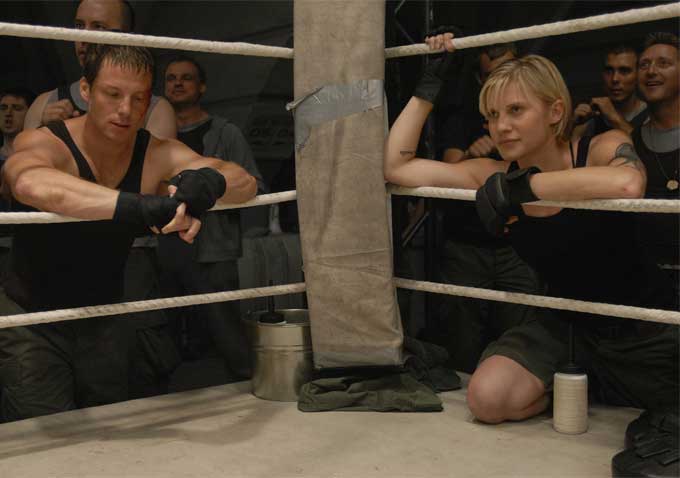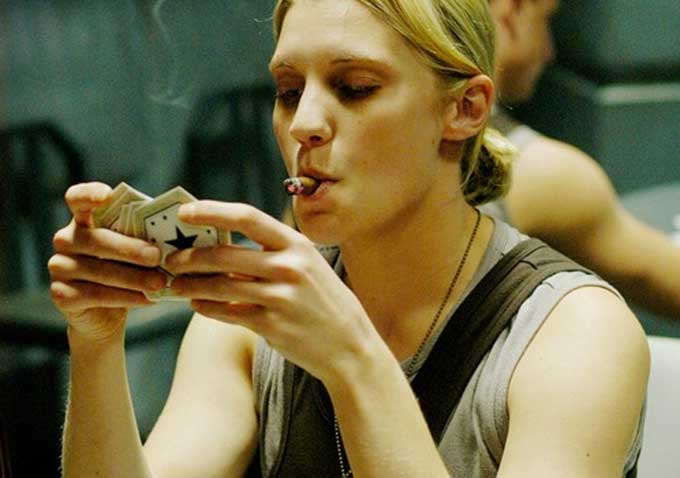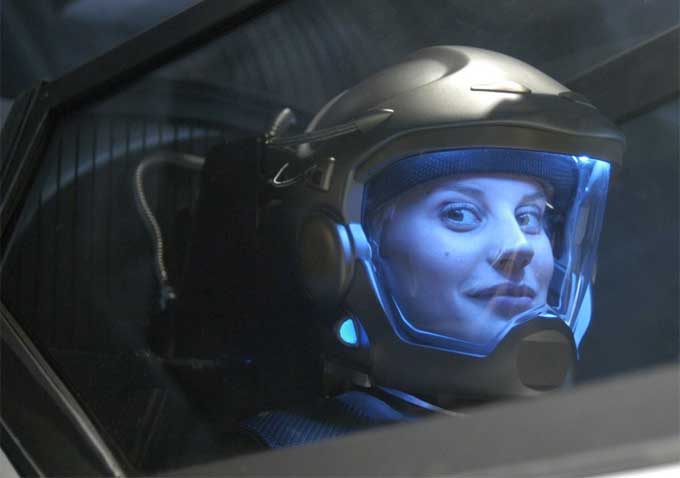By providing your information, you agree to our Terms of Use and our Privacy Policy. We use vendors that may also process your information to help provide our services. This site is protected by reCAPTCHA Enterprise and the Google Privacy Policy and Terms of Service apply.
Women Behaving Badly: Kara ‘Starbuck’ Thrace, the Cocky, Troublemaking Pilot From ‘Battlestar Galactica’
Erik McClanahan

Editor’s Note: The TV landscape is filled with male antiheroes, from Nicholas Brody to Walter White, but what about the women? This is part two of a series of five articles exploring flawed female protagonists and how their bad behavior makes them so interesting to watch. It’s presented in partnership with Netflix and its new original series “Orange is the New Black” (all episodes available July 11th, only on Netflix).
Before it ever aired on TV, Syfy’s reimagining of “Battlestar Gallactica” had an uphill battle to fight. Many fans of the original, 1978 version — a rote and admittedly cheesy “Star Wars” knockoff — were not happy when it was announced that one of the show’s most popular characters would go from a womanizing, anti-authoritarian, cocky, cigar-chomping gambler, drinker and all around badass fighter pilot dude to a (wait for it)… anti-authoritarian, cocky, cigar-chomping gambler, drinker and all around badass fighter pilot woman who digs sex with no strings attached. How dare they!
 Series developer Ronald D. Moore explained why the convention was turned on its head in a piece in Wired: “Making Starbuck a woman was a way of avoiding what I felt would be ‘rogue pilot with a heart of gold’ cliche.” He was right. By keeping the two characters pretty much the same except for their gender, the newer, smarter, better version of “BSG” gracefully paid respect to the original while boldly moving into a more modern, subversive sphere of television. As exciting as the grand mythology, narrative and world-building was in “BSG” 2.0, it was the characters that made it work, and this new Starbuck, despite the initial fan outcry, proved to be its most complex and flat-out cool figure.
Series developer Ronald D. Moore explained why the convention was turned on its head in a piece in Wired: “Making Starbuck a woman was a way of avoiding what I felt would be ‘rogue pilot with a heart of gold’ cliche.” He was right. By keeping the two characters pretty much the same except for their gender, the newer, smarter, better version of “BSG” gracefully paid respect to the original while boldly moving into a more modern, subversive sphere of television. As exciting as the grand mythology, narrative and world-building was in “BSG” 2.0, it was the characters that made it work, and this new Starbuck, despite the initial fan outcry, proved to be its most complex and flat-out cool figure.
In a recent piece on Slate titled “Why We’ll Never Have A Female Tony Soprano,” writer Alyssa Rosenberg states that “[women] get penalized rather than rewarded for displaying masculine traits like aggression, physical force, ambition or selfishness. Efforts to create female antiheroes with masculine qualities… have failed because those characters are initially seen as evil rather than admirable.” Funny thing is, that’s pretty much exactly what actress Katee Sackhoff, Moore and his writing team succeeded in doing with their version of Starbuck.
Sackhoff took what was so well written on the page and brought it to life, playing Kara Thrace, callsign “Starbuck,” as the toughest, most macho, self-destructive person on the show. She acts like a man, is flawed in the way most male antiheroes are, she does stupid, misguided things, almost proves to be the harbinger of death to the sole remaining humans in the galaxy — and yet, we love her. I’d even argue as a cherry-on-top bonus that this Starbuck also gets to be sexy as hell — and in control of her own sexual agency — even though she rarely was made up or dressed as a traditional pretty woman on TV. How many of the popular modern male antihero characters can claim all that?
 So while Rosenberg is not wrong in claiming, “Shows with difficult female heroines have to travel in a different direction than shows about difficult men do, dismantling distaste for their female characters and building sympathy for them, rather than moving toward a moral revelation about how we’ve fooled ourselves by worshiping that man,” she does seem to be forgetting about Starbuck.
So while Rosenberg is not wrong in claiming, “Shows with difficult female heroines have to travel in a different direction than shows about difficult men do, dismantling distaste for their female characters and building sympathy for them, rather than moving toward a moral revelation about how we’ve fooled ourselves by worshiping that man,” she does seem to be forgetting about Starbuck.
Again, despite the initial fan outcry to a feminine take on the character, nearly all watchers of “BSG” 2.0 seemed to be big fans of this character once we saw her in action, regardless of how dangerous or unlikeable (yet in the end, redeemed) she became as the show progressed. Then again, when Rosenberg states further on in the piece that, “instead of female antiheroism, maybe what we need is television storytelling that deals with our preconceived ideas about femininity in the same way that antihero dramas have served and challenged our understanding of what it means to be an American man,” it’s as if she’s talking directly about Sackhoff’s Starbuck. This character was so complex, messy and human that she could be an antihero while also messing with our outdated notions of what a woman on TV could be.
For Sackhoff, who before “BSG” was relegated to stereotypical blond roles in horror movies and lesser known shows, and unfortunately since has not gotten a role worthy of her immense talents, was quoted in The Vancouver Sun as saying, “I let the fact that people questioned whether or not a woman could play a man’s role dictate how I was going to play her.” She was even booed at Comic-Con before the miniseries debuted. The world of geekdom is often misguided, afraid of change and awash in unfortunate, confused misogyny. Funny, then, how all the naysayers were silenced when “Battlestar Gallactica” became a hit for what was then called the Sci-Fi Channel, running for four seasons and proving the maxim that remakes are better when a bad property with a strong concept is being re-imagined.
 Luckily, the actress knew she brought her A-game, when she mentioned in Entertainment Weekly that, “I was booed. It was lovely. At that point, I’d seen the miniseries and I knew I’d done a good job. I had my confidence back. I didn’t care anymore.” It is hard to classify Sackhoff’s performance as Starbuck in “BSG” as straight-up antiheroic, at least in the classical sense. But the many layers and gradual, twist-filled evolution of the character throughout the show proved that women could be just as tough as the guys (or, in her case, tougher), even more complicated, and able to transcend audience expectations. So maybe the solution is not so much to redefine our notion of difficult female characters, but to look at shows that have accomplished this already on their own terms and evolve from there. Starbuck certainly isn’t a female Tony Soprano, but she is proof that, if done well, audiences, while slow to accept change, will root for a woman who does bad things.
Luckily, the actress knew she brought her A-game, when she mentioned in Entertainment Weekly that, “I was booed. It was lovely. At that point, I’d seen the miniseries and I knew I’d done a good job. I had my confidence back. I didn’t care anymore.” It is hard to classify Sackhoff’s performance as Starbuck in “BSG” as straight-up antiheroic, at least in the classical sense. But the many layers and gradual, twist-filled evolution of the character throughout the show proved that women could be just as tough as the guys (or, in her case, tougher), even more complicated, and able to transcend audience expectations. So maybe the solution is not so much to redefine our notion of difficult female characters, but to look at shows that have accomplished this already on their own terms and evolve from there. Starbuck certainly isn’t a female Tony Soprano, but she is proof that, if done well, audiences, while slow to accept change, will root for a woman who does bad things.
Watch “Battlestar Galactica” now at Netflix.
Indiewire has partnered with Netflix and its new original series “Orange is the New Black” (all episodes available July 11th, only on Netflix). From the creator of “Weeds” comes a heartbreaking and hilarious new series set in a women’s prison. Piper Chapman’s wild past comes back to haunt her, resulting in her arrest and detention in a federal penitentiary. To pay her debt to society, Piper trades her comfortable New York life for an orange prison jumpsuit and finds unexpected conflict and camaraderie amidst an eccentric group of inmates. For more visit here.
By providing your information, you agree to our Terms of Use and our Privacy Policy. We use vendors that may also process your information to help provide our services. This site is protected by reCAPTCHA Enterprise and the Google Privacy Policy and Terms of Service apply.

















